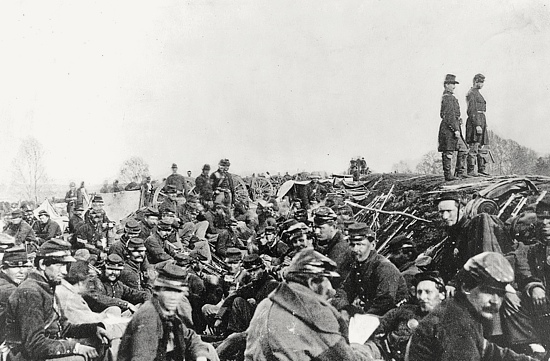Civil War: The Horrors of War
Two gory stories from the fighting around Petersburg, 150 years ago this month.

With Halloween just around the corner, I originally planned to look for a Richmond Civil War ghost story to share, but thought instead I’d take a different tack. As I was reading diary entries and letters from soldiers living in the trenches outside Richmond and Petersburg in 1864, it reminded me that the things seen by the soldiers who fought in the Civil War were surely on par with any horror movie.
While reading stories of life in the Petersburg trenches, I found a handful written by Henry Fitzgerald Charles, a Union soldier who fought in the 21st Pennsylvania Cavalry. Charles first enlisted in 1862 and then reinlisted twice more during the war. In 1864, he found himself involved in multiple battles and skirmishes around Petersburg. He later wrote a memoir based around the battlefield diary he kept during the war.
After the fighting that took place around Petersburg in the last days of September and early October, Charles had two encounters on the battlefield that, as I read about them in his memoir, sent chills up my spine. Fair warning: they’re both pretty gory.
In early October, Charles described being marched after dark to a hiding position along the ridge of a hill, waiting for a Confederate attack to come. With “muskets fully primed and pointed to the edge of the hill…we were laying on the ground quietly with our hearts in our throats waiting for the Rebs to charge.” The Confederates never charged because they didn’t know the Union troops were there waiting. As they crested the hill, the Union force opened up a deadly volley on the approaching enemy. Charles remarked “I thought it would shake the earths when all our guns exploded into Rebs coming over the hill. I never saw so many dead soldiers and officers as they lost here.”
The next day, Charles went on to describe the scene he discovered near the battlefield of the night before:
Next day, some of us went back over the field, and seeing the mess, we wondered what had become of our blasted civilization that it permitted man to kill and maim, like was done here on the battlefield. Then I happened onto where their field hospital had been located. Oh, what a sight. The dead and wounded had all been removed, but the arms and legs that had been amputated still lay there on a pile. Some with boots and shoes still on, parts of pants and underwear, and arms with white hands sticking out of tattered shirt sleeves. You got sick looking at all the blood and dirt and could almost feel the pain that was suffered there. It was the most disgusting scene I ever saw and I hoped it would be the last. But then, little did I know what would be in store for me and that I would see it repeated more than I want to remember. We turned away from it disgusted awondering how a human could endure it. Civil War Diary of Henry Fitzgerald Charles
Just a few days later, Charles would have a close brush with death himself:
Another soldier boy and I started over the battlefield and into the woods where men had thrown their things away or discarded it when they were wounded. Lots of dead were laying around with a few shovels of dirt thrown on them by the burial detail. We came unto a field where we sat down together on a log to chat awhile and to rest. All at once I heard a gun crack and at the same time my mouth was filled with another man’s brains. There was a sharpshooter in the distant woods somewhere and we were a too tempting bait for him. I studied for years why he took him instead of me. I reckon he waited till he had us both in line and was going to kill two birds with one stone, but my friend’s head was too hard – it reflected the bullet. If I swallowed any of it, it certainly came up along with everything else I had in my stomach. My whole body rebelled, and I pulled out of that place fast like a through train. I was also hit in the face by a piece of human flesh at Petersburg one night. With what part of the body I can’t tell, as at the time I did not wait to investigate, as there was more important business on the program. Civil War Diary of Henry Fitzgerald Charles
Charles’s commitment to focusing on the “more important business” of staying alive paid off: he remained enlisted through the end of the war and survived unscathed. He returned home to Pennsylvania and lived to be 84 years old. His battlefield stories, while occasionally gruesome, serve as another reminder that while we glorify Civil War generals and their strategies, it was the soldiers that did the fighting and dying. It’s also a Halloween-specific reminder that the next time I get the urge to watch a horror movie, maybe I should read another Civil War book instead.
-
Recommend this
on Facebook -

Report an error
-

Subscribe to our
Weekly Digest




There are 2 reader comments. Read them.